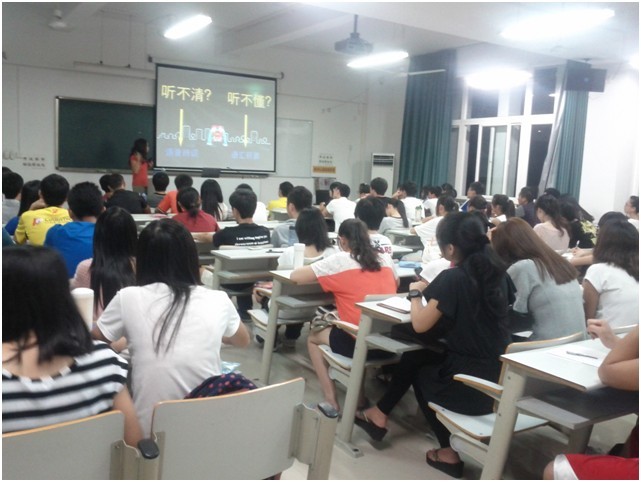 返回
教育头条
返回
教育头条

分享英语四级真题阅读精讲精练
学习英语,每日一练很重要,今天小编为大家分享的是2018年英语四级真题阅读精讲精练,希望对大家有所帮助。
That people often experience trouble sleeping in a different bed in unfamiliar surroundings is a phenomenon known as the "first-night" effect. If a person stays in the same room the following night they tend to sleep more soundly. Yuka Sasaki and her colleagues at Brown Univers ity set out to investigate the origins of this effect. Dr. Sasaki knew the first-night effect probably has something to do with how humans evolved. The puzzle was what benefit would be gained from it when performance might be affected the following day. She also knew from previous work conducted on birds and dolphins that these animals put half of their brains to sleep at a time so that they can rest while remaining alert enough to avoid predators ( 捕食者). This led her to wonder if people might be doing the same thing. To take a closer look, her team studied 35 healthy people as they slept in the unfamiliar environment of the university's Department of Psychological Sciences.The participants each slept in the department for two nights and were carefully monitored with techniques that looked at the activity of their brains. Dr.Sasaki found, as expected, the participants slept less well on their first night than they did on their second, taking more than twice as long to fall asleep and sleeping less overall. During deep sleep, the participants' brains behaved in a similar manner seen in birds and dolphins. On the first night only, the left hemispheres ( 半球) of their brains did not sleep nearly as deeply as their right hemispheres did. Curious if the left hemispheres were indeed remaining awake to process information detected in the surrounding environment, Dr. Sasaki re-ran the experiment while presenting the sleeping participants with a mix of regularly timed beeps ( 蜂鸣声) of the same tone and irregular beeps of a different tone during the night. She worked out that, if the left hemisphere was staying alert to keep guard in a strange environment, then it would react to the irregular beepsby stirring people from sleep and would ignore the regularly timed ones. This is precisely what she found.
Questions: Step I: True or False 1. When Dr. Yuka Sasaki did her research, She found birds and dolphins remain alert while asleep. 2. When she first did herexperiment, She studied the differences between the two sides of participants' brains. 3. If a person stays in the new room the following night they tend to sleep more soundly. 4. During deep sleep, the participants' brains behaved in a similar manner seen in birds and dolphins. Step 2: 词汇解析: 1. tend to do… 往往会…; 倾向于… E.g.: The sort of music I listen to varies,but it tends to light music. 我所听的音乐形形色色, 不过一般都是轻音乐。 2. Soundlyadv. 酣睡,睡得沉;明智地,可靠地;完全彻底的 Eg: If you sleep soundly, you sleep very well and very deeply. A soundly based conclusion 有充分依据的结论 The team was soundly defeated. 这个队一败涂地。 3. Set out to do… 开始着手做某事=set about doing… Eg: We set out to paint the whole house but finished only the front part that day. 4. have sth. to do with… 与 … 有关系 Eg: What you said had nothing to do withme. 5. remain 保持,仍然是(系动词) Eg: remain silent/seated Step3 : 长难句分析并翻译: 1. That people often experience troublesleeping in a different bed in unfamiliar surroundings is a phenomenon known asthe "first-night" effect. 2. The puzzle was what benefit would begained from it when performance might be affected the following day. 3. She also knew from previous work conducted on birds and dolphins that these animals put half of their brains to sleep at a time so that they can rest while remaining alert enough to avoid predators. ( 捕食) Step 4.根据短文内容填空 : People often have the trouble

1._________ (sleep) in a different bed in unfamiliar surroundings,
2._______ is a phenomenon known as the"first-night" effect. Yuka Sasaki and her colleagues at Brown University set out
3._______ (study) the origins of this effect. Dr. Sasaki knew the first-night effect probably has something to do
4._____ how human sevolved. She also knew from previous work
5._________ (conduct) on birds and dolphins that these animals put half of their brains to sleep at a time so that they can rest while
6._________(remain) alert enough to avoid predators ( 捕食者). This led her to wonder if people might be doing
7______ same thing. So he did a research and found during deep sleep, the participants' brains behaved in a similar manner seen in birds and dolphins. Curious if the left hemispheres were indeed remaining 8___(wake) to process information detected in the
9___________(surround) environment, she did another research and worked out if the left hemisphere was staying alert to keep guard in a strange environment, then it would react to the irregular beeps by stirring people from sleep and would ignore the regularly timed ones. This is precisely
10._______she found. 参考答案: StepI: FFFT Step3: 长难句翻译 1. 人们 在陌生的环境下经常经历睡眠困难的现象被认为是一、晚效应。 2. 困惑是当第二天的表现可能受影响的情况下,人们能从中获得什么好处。 3. 从以前对鸟类和海豚的研究中她得知这些动物一次只有一半大脑休息,以致于当他们睡觉时能保持警觉来避免捕食者。 Step 4. 根据短文内容填空: 1. sleeping 析:have the trouble in doing… 在做… 方面有困难,in 可省略。 2. which 析:引导非性定语从句。 3. to study 析:set out to do… 开始着手干… 4. with 析:have sth. to do with… 固定搭配 5. conducted 析:考查非谓语动词 6. remaining 析:考查状语从句后的省略 7. the 析:固定搭配 8. awake 析:考查remain 可以当系动词用法 9. surrounding 析:考查词性转换 10. what 析:考查名词性从句引导词的用法
在看
That people often experience trouble sleeping in a different bed in unfamiliar surroundings is a phenomenon known as the "first-night" effect. If a person stays in the same room the following night they tend to sleep more soundly. Yuka Sasaki and her colleagues at Brown Univers ity set out to investigate the origins of this effect. Dr. Sasaki knew the first-night effect probably has something to do with how humans evolved. The puzzle was what benefit would be gained from it when performance might be affected the following day. She also knew from previous work conducted on birds and dolphins that these animals put half of their brains to sleep at a time so that they can rest while remaining alert enough to avoid predators ( 捕食者). This led her to wonder if people might be doing the same thing. To take a closer look, her team studied 35 healthy people as they slept in the unfamiliar environment of the university's Department of Psychological Sciences.The participants each slept in the department for two nights and were carefully monitored with techniques that looked at the activity of their brains. Dr.Sasaki found, as expected, the participants slept less well on their first night than they did on their second, taking more than twice as long to fall asleep and sleeping less overall. During deep sleep, the participants' brains behaved in a similar manner seen in birds and dolphins. On the first night only, the left hemispheres ( 半球) of their brains did not sleep nearly as deeply as their right hemispheres did. Curious if the left hemispheres were indeed remaining awake to process information detected in the surrounding environment, Dr. Sasaki re-ran the experiment while presenting the sleeping participants with a mix of regularly timed beeps ( 蜂鸣声) of the same tone and irregular beeps of a different tone during the night. She worked out that, if the left hemisphere was staying alert to keep guard in a strange environment, then it would react to the irregular beepsby stirring people from sleep and would ignore the regularly timed ones. This is precisely what she found.
Questions: Step I: True or False 1. When Dr. Yuka Sasaki did her research, She found birds and dolphins remain alert while asleep. 2. When she first did herexperiment, She studied the differences between the two sides of participants' brains. 3. If a person stays in the new room the following night they tend to sleep more soundly. 4. During deep sleep, the participants' brains behaved in a similar manner seen in birds and dolphins. Step 2: 词汇解析: 1. tend to do… 往往会…; 倾向于… E.g.: The sort of music I listen to varies,but it tends to light music. 我所听的音乐形形色色, 不过一般都是轻音乐。 2. Soundlyadv. 酣睡,睡得沉;明智地,可靠地;完全彻底的 Eg: If you sleep soundly, you sleep very well and very deeply. A soundly based conclusion 有充分依据的结论 The team was soundly defeated. 这个队一败涂地。 3. Set out to do… 开始着手做某事=set about doing… Eg: We set out to paint the whole house but finished only the front part that day. 4. have sth. to do with… 与 … 有关系 Eg: What you said had nothing to do withme. 5. remain 保持,仍然是(系动词) Eg: remain silent/seated Step3 : 长难句分析并翻译: 1. That people often experience troublesleeping in a different bed in unfamiliar surroundings is a phenomenon known asthe "first-night" effect. 2. The puzzle was what benefit would begained from it when performance might be affected the following day. 3. She also knew from previous work conducted on birds and dolphins that these animals put half of their brains to sleep at a time so that they can rest while remaining alert enough to avoid predators. ( 捕食) Step 4.根据短文内容填空 : People often have the trouble

1._________ (sleep) in a different bed in unfamiliar surroundings,
2._______ is a phenomenon known as the"first-night" effect. Yuka Sasaki and her colleagues at Brown University set out
3._______ (study) the origins of this effect. Dr. Sasaki knew the first-night effect probably has something to do
4._____ how human sevolved. She also knew from previous work
5._________ (conduct) on birds and dolphins that these animals put half of their brains to sleep at a time so that they can rest while
6._________(remain) alert enough to avoid predators ( 捕食者). This led her to wonder if people might be doing
7______ same thing. So he did a research and found during deep sleep, the participants' brains behaved in a similar manner seen in birds and dolphins. Curious if the left hemispheres were indeed remaining 8___(wake) to process information detected in the
9___________(surround) environment, she did another research and worked out if the left hemisphere was staying alert to keep guard in a strange environment, then it would react to the irregular beeps by stirring people from sleep and would ignore the regularly timed ones. This is precisely
10._______she found. 参考答案: StepI: FFFT Step3: 长难句翻译 1. 人们 在陌生的环境下经常经历睡眠困难的现象被认为是一、晚效应。 2. 困惑是当第二天的表现可能受影响的情况下,人们能从中获得什么好处。 3. 从以前对鸟类和海豚的研究中她得知这些动物一次只有一半大脑休息,以致于当他们睡觉时能保持警觉来避免捕食者。 Step 4. 根据短文内容填空: 1. sleeping 析:have the trouble in doing… 在做… 方面有困难,in 可省略。 2. which 析:引导非性定语从句。 3. to study 析:set out to do… 开始着手干… 4. with 析:have sth. to do with… 固定搭配 5. conducted 析:考查非谓语动词 6. remaining 析:考查状语从句后的省略 7. the 析:固定搭配 8. awake 析:考查remain 可以当系动词用法 9. surrounding 析:考查词性转换 10. what 析:考查名词性从句引导词的用法
在看
好了,以上就是分享英语四级真题阅读精讲精练的介绍,如对本文有疑问或者想了解更多四级六级考试信息,请与我们联系,我的微信18560125702。教育宝是一家教培行业第三方平台,5年以上工作经验的学习顾问能给你最客观公正的建议,帮你辨别课程好坏,为你提供学习帮助。返回教育宝头条
【免责声明】本文仅代表作者本人观点,与教育宝无关。教育宝对文中陈述、观点判断保持中立,不对所包含内容的准确性、可靠性或完整性提供任何保证。请读者仅作参考,特此声明!





